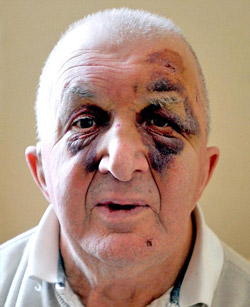原文:
咬得体无完肤,抓得指无余力。(钱钟书 - 《围城》 )
翻译关键词:体无完肤,指无余力
译文:
He was bitten till there wasn't one piece of skin left whole, and he plucked till his fingers went limp. (美 Jeanne Kelly, Nathan K.Mao <译> –Fortress Besieged)
翻译笔记:
体无完肤

“体无完肤”在汉语中通常有两种释义:
1. 全身没有一块好皮肤。形容浑身受伤。英译时我们常可处理为:have cuts and bruises all over the body; be a mass of bruises。值得注意的是,在汉译英四字结构的词语时,我们不必拘泥于原文,只要用英文中的形容词、名词或一些特殊结构来处理就可以了。如:
被打得体无完肤 be beaten black and blue
又如《围城》中的“被咬得‘体无完肤’”
was bitten till there wasn't one piece of skin left whole
2. 比喻论点被彻底驳倒或文章被大量删改。此时我们常用be thoroughly refuted or exposed; be criticized scathingly; be torn to pieces(or shreds)来表达。如:
这种谬论早已被批得体无完肤。
This fallacy has long since been torn to shreds.
指无余力
“指无余力”即“手指没有剩余的力量;手指已经软弱无力”,所以译文为fingers went limp很贴切。在这个词语的处理上,我们不易将“余力(surplus energy / strength / vigour)”直译出来,如果将原文译为fingers have no surplus energy读起来不符合英语表达的习惯。直译的用法可以这样用:
没有余力顾及此事
have no energy left to attend to the matter
相关阅读
(来源:沪江英语 编辑:崔旭燕)